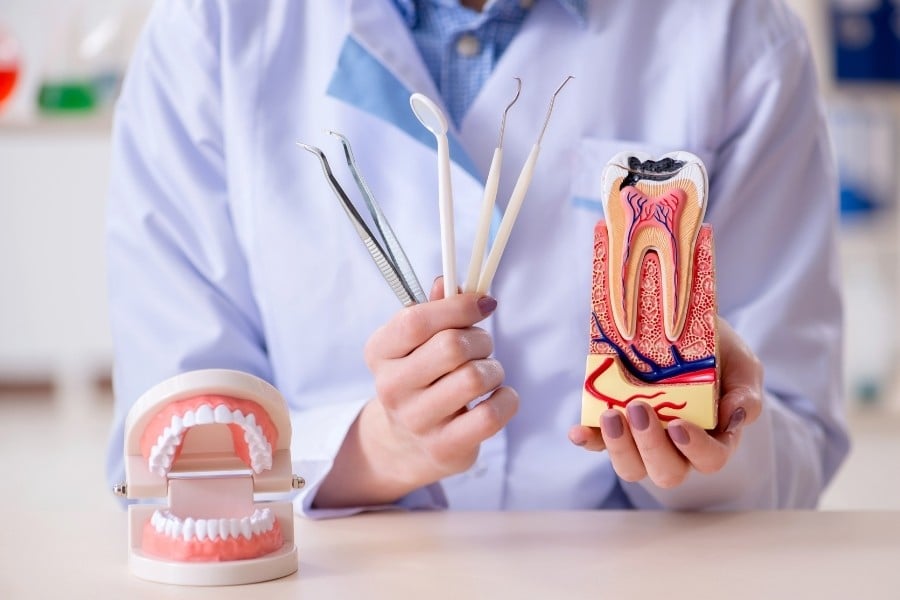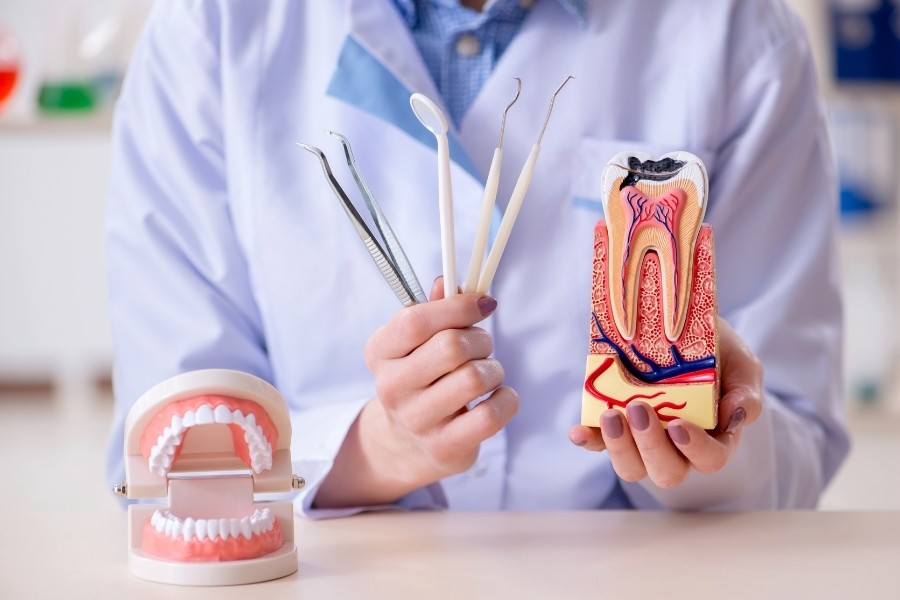Let’s be honest: most people don’t look forward to getting a root canal. Whether or not you’re a fan of the dentist, the idea of oral surgery gives most people the heebie-jeebies.
The good news is that root canals aren’t as terrifying as you might think. Sure, some people would rather walk on a tightrope or swim with sharks before treating an infected tooth. But the wonderful world of anaesthesia and talented dentists can make it as tolerable as a regular filling.
We recently explained what happens during a root canal with our Dentist, Dr. Yasmin Vakilian, in this blog post. But what are the signs that you might need one? In this post, we’re sitting down with our Dentist once more to uncover the truth about your tooth.
What Is a Root Canal?
First, let’s cover the basics about what a root canal is and why it’s used in dentistry. Root canals are similar to standard fillings, but the difference lies in which area of the tooth is being treated.
A standard filling is performed when a portion of the tooth’s surface has decayed, cracked, broken, or become worn down. The Dentist removes the decaying matter, then fills in the hole with a filling material.
“The same applies for a root canal, but instead we basically just fill the inside of the roots of their teeth,” Dr. Vakilian explains. “Because it’s inside of the tooth it’s a longer procedure. Not because it’s more complicated — it’s just harder to get to the area.”
An infected tooth nerve is the main reason why you might need a root canal, and according to Dr. Vakilian, the signs of this happening are hard to miss. Here are the top 3 that you should know about.

What Are the Signs of Needing a Root Canal?
-
Sharp, severe pain. This is the #1 most common and tell-tale sign that you might need a root canal. The pain might be so severe that it interferes with your sleep, and it will often feel worse when you’re lying down.
-
An abscess or pus coming out of the gum. If you see a physical pimple on the gum, it’s a sign that the tooth underneath might be infected.
-
Your tooth feels high. It might feel like you’re biting down on one tooth before the others. While this sign is less common, it could still be an indication that you have an infection.
Out of these three signs, sharp and severe pain is the most probable and the most obvious. Most people would rank it at a 10 on the pain scale. Unlike cavities, which can cause little to no pain in their early stages, an infected tooth nerve is likely to cause extreme discomfort. It’s important to know your options and have a trusted Dentist available to you if you experience any of these symptoms.
Our team at HealthOne performs dental examinations so we can get a closer look at your oral health. We can confirm if your tooth nerve has become infected during this comprehensive appointment and whether or not a root canal treatment might be needed.
The silver lining is that the root canal treatment itself doesn’t hurt. “We use anaesthesia, so the tooth is numb like it would be for a filling,” Dr. Vakilian explains. “You don’t feel anything, but you’re not asleep. The pain goes away after the procedure because we remove the infected nerve that is causing it.”
Not only is the treatment itself fairly straightforward, but the recovery is also simple to deal with as well. We asked Dr. Vakilian for more details about the recovery process to learn more.
Can I Eat After a Root Canal?
Many people assume that the aftermath of a root canal is anything but fun. Luckily, the truth about your tooth after treatment is that recovery is quick and non-invasive.
“The only thing to keep in mind is that you’ll be numb for an hour or two after the procedure,” she says. “We say you should eat with caution in case you bite your cheek or whatnot. But otherwise, there are no restrictions in terms of eating after a root canal.”

What Should I Avoid After a Root Canal?
There’s nothing specific that you need to avoid after getting a root canal done. Once your numbing goes away, you can resume your daily habits and activities. “Everyone thinks root canals are scary, and they have such a negative connotation – but they’re really not,” Dr. Vaklian says.
See? Not much different from getting a cavity filled. The dentist isn’t so scary after all!
Root Canal Cost in Toronto
If you’ve read this blog and realized that you might need a root canal, look no further! Our team of experienced and patient-focused Dentists will ensure that your experience goes as smoothly as possible.
Many people wonder what the cost of a root canal is in Toronto, and at HealthOne, it varies from patient to patient. “It depends on how many canals are in the tooth, as well as which tooth needs the root canal and the severity,” Dr. Vakilian explains.
An examination is the first step. After that, your Dentist will discuss the estimated cost for treatment and your options for payment plans. We prioritize making our services accessible to everyone and accept most major insurance providers.
Having an infected tooth nerve is far from enjoyable, but having it removed during a root canal treatment will put your pain at rest. We take extra care in talking you through every step of the procedure and making sure you feel comfortable the entire time.
One Life. Live Inspired.


